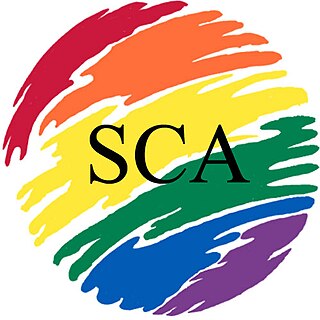
Alcoholics Anonymous (AA) is an international peer-led mutual aid fellowship dedicated to abstinence-based recovery from alcoholism through its spiritually-inclined Twelve Step program. Following its Twelve Traditions, AA is non-professional and non-denominational as well as apolitical and unaffiliated. In 2020 AA estimated its worldwide membership to be over two million, with 75% of those in the U.S. and Canada.
Twelve-step programs are international mutual aid programs supporting recovery from substance addictions, behavioral addictions and compulsions. Developed in the 1930s, the first twelve-step program, Alcoholics Anonymous (AA), founded by Bill Wilson and Bob Smith, aided its membership to overcome alcoholism. Since that time dozens of other organizations have been derived from AA's approach to address problems as varied as drug addiction, compulsive gambling, sex, and overeating. All twelve-step programs utilize a version of AA's suggested twelve steps first published in the 1939 book Alcoholics Anonymous: The Story of How More Than One Hundred Men Have Recovered from Alcoholism.
Rational Recovery was a commercial vendor of material related to counseling, guidance, and direct instruction for addiction designed as a direct counterpoint to Alcoholics Anonymous (AA) and twelve-step programs.

Narcotics Anonymous (NA), founded in 1953, describes itself as a "nonprofit fellowship or society of men and women for whom drugs had become a major problem." Narcotics Anonymous uses a 12-step model developed for people with varied substance use disorders and is the second-largest 12-step organization.
A food or eating addiction is any behavioral addiction that is primarily characterized by the compulsive consumption of palatable food items which markedly activate the reward system in humans and other animals despite adverse consequences.

Marijuana Anonymous (MA) founded in 1989 is an organization and twelve-step program for people with common desire to maintain abstinence from marijuana.

Emotions Anonymous (EA) is a twelve-step program for recovery from mental and emotional illness. As of 2017 there were approximately 300 Emotions Anonymous groups active in the United States and another 300 around the world.
Fasting is very common among Jains and as a part of festivals. Most Jains fast at special times such as birthdays, anniversaries, during festivals, and on holy days. Paryushan is the most prominent festival, lasting eight days in Svetambara Jain tradition and ten days in Digambar Jain tradition during the monsoon. The monsoon is a time for Jains to observe most of the religious procedures. However, a Jain may fast at any time. Jain saints usually perform fasts every now and then but at times it becomes a compulsion for them when they have committed an error in relation to the preachings of Mahavira. Variations in fasts encourage Jains to do whatever they can to maintain whatever self control is possible for the individual. According to Jain texts, abstaining from the pleasures of the five senses such as sounds and dwelling in the self in deep concentration is fasting (upavāsa).
Overeaters Anonymous (OA) is a twelve-step program founded in 1960 for people with problems related to food including, but not limited to, compulsive overeaters, those with binge eating disorder, bulimics and anorexics. Anyone with a problematic relationship with food is welcomed; OA's Third Tradition states that the only requirement for memberships is a desire to stop eating compulsively.

Sexual Compulsives Anonymous (SCA) is a twelve-step program for people who want to stop having compulsive sex. SCA founding is attributed variously to 1982 in New York City and to 1973 in Los Angeles. Although the fellowship originally sought to address issues of sexual compulsion among gay and bisexual men, and this is still the fellowships predominant demographic, today the program is LGBT friendly, open to all sexual orientations, and there is an increasing number of women and heterosexual men participating. SCA meetings are most likely to be held in urban areas with larger gay and bisexual male populations. The majority of members are white, but vary in age and socioeconomic background. The only requirement for membership is a desire to stop having compulsive sex.
Debtors Anonymous (DA) is a twelve-step program for people who want to stop incurring unsecured debt. Collectively they attend more than 500 weekly meetings in fifteen countries, according to data released in 2011. Those who compulsively incur unsecured debt are said to be engaged in compulsive borrowing and are known as compulsive debtors.
Sex Addicts Anonymous (SAA) is a twelve-step program founded in 1977 for people who want to stop their addictive sexual behavior. There also exists a group known as COSA, for those who have been impacted by others' sexual addiction.
Sex and Love Addicts Anonymous (SLAA) is a twelve-step program for people recovering from sex addiction and love addiction. SLAA was founded in Boston, Massachusetts in 1976, by a member of Alcoholics Anonymous (AA). Though he had been a member of AA for many years, he repeatedly acted out and was serially unfaithful to his wife. He founded SLAA as an attempt to stop his compulsive sexual and "romantic" behavior. SLAA is also sometimes known as the Augustine Fellowship, because early members saw many of their shared symptoms described by St. Augustine of Hippo in his work Confessions. COSLAA is another twelve-step fellowship created to support the family members and friends of sex and love addicts.
Drug addiction recovery groups are voluntary associations of people who share a common desire to overcome their drug addiction. Different groups use different methods, ranging from completely secular to explicitly spiritual. Some programs may advocate a reduction in the use of drugs rather than outright abstention. One survey of members who found active involvement in any addiction recovery group correlates with higher chances of maintaining sobriety. Although there is not a difference in whether group or individual therapy is better for the patient, studies show that any therapy increases positive outcomes for patients with substance use disorder. The survey found group participation increased when the individual members' beliefs matched those of their primary support group. Analysis of the survey results found a significant positive correlation between the religiosity of members and their participation in twelve-step programs and to a lesser level in non-religious SMART Recovery groups, the correlation factor being three times smaller for SMART Recovery than for the twelve-step addiction recovery groups. Religiosity was inversely related to participation in Secular Organizations for Sobriety.
Workaholics Anonymous (WA) is a twelve-step program founded circa 1983 for people identifying themselves as "powerless over compulsive work, worry, or activity" including, but not limited to, workaholics–including overworkers and those who suffer from unmanageable procrastination or work aversion. Anybody with a desire to stop working compulsively is welcome at a WA meeting. Unmanageability can include compulsive work in housework, hobbies, fitness, or volunteering as well as in paid work. Anyone with a problematic relationship with work is welcomed. Workaholics Anonymous is considered an effective program for those who need its help.

LifeRing Secular Recovery is a secular, non-profit organization providing peer-run addiction recovery groups. The organization provides support and assistance to people seeking to recover from alcohol and drug addiction, and also assists partners, family members and friends of addicts or alcoholics. It is an abstinence-based recovery program with three fundamental principles: sobriety, secularity and self-empowerment. The motto of LifeRing is "empower your sober self."
Food Addicts in Recovery Anonymous (FA) founded in 1998 is a program of recovery based on the twelve steps of Alcoholics Anonymous. FA members are men and women of all ages. Some have been obese; others have been severely underweight, bulimic, or so obsessed with food or weight that normal life was difficult or impossible. The common denominator uniting members of FA is addiction and a relationship with food that parallels an alcoholic's relationship with alcohol. The program offers the hope of long-term recovery, evidenced by members who have continuously maintained a normal weight and healthy eating for periods of twenty-five or even thirty years.

Pills Anonymous (PA) is a twelve-step program founded in 1972 for people who seek recovery from prescription drug addiction. PA is patterned very closely after Alcoholics Anonymous, although the two groups are not affiliated.
Heroin Anonymous (HA) is a non-profit group founded in Phoenix, AZ in 2004 to help people addicted to heroin remain substance-free. Modeled after Alcoholics Anonymous, HA is a fellowship of people addicted to heroin who meet regularly to help each other practice complete abstinence from all drugs and alcohol. Heroin Anonymous does not provide drug counseling, medical or psychiatric treatment, or chemical dependency treatment.







